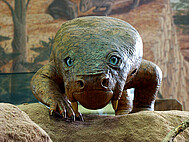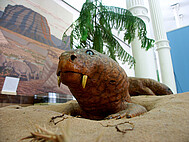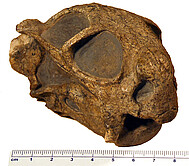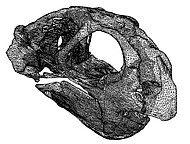Tasks of the Palaeontology and Evolution �section
Our staff spends most of the time in the collections and exhibitions, occasinonally also working from home - therefore, we ask you to contact us via email!
The literal translation of palaeontology means “the science of ancient life”. Palaeontology deals with fossilized remnants of past life. These fossils amongst other things permit us to reconstruct evolutionary processes. The following tasks are part of the work performed by the Palaeontology and Evolution section:
- Collecting, preparing, identifying and describing (i.e. the taxonomy) prehistoric animal and plant species, including those found during our own excavations.
- Archiving and providing collection and field data for the scientific community and the interested public - if possible via databases and Internet gateways.
- Scientifically and technically curating the palaeontological collections from the Cambrian (550 Ma) until the ice age (10.000 years), from fossilized single cells all the way to invertebrates (mollusks, arthropods) and vertebrates (fishes, amphibians, reptiles, mammals). A well-dated collection of fossil plants is also part of the collections.
- Palaeobiology: reconstructing the life style of extinct animals based on comparative anatomy and biomechanical analyses.
- Taphonomy: reconstructing the cause of death, as well as embedding and preservation processes.
- Palaeobiogeography: studying the history of the distribution of extinct organisms over long-bygone straits and land corridors.
- Palaeoecology: reconstructing the interaction between extinct animals and animal communities; reconstructing the causes of thanatocoenoses (death assemblages).
- Reconstructing evolutionary processes.
- Discussing and presenting research results in conferences and workshops as well as publications in scientific journals, books and the Internet.
- Planning and presenting exhibits with palaeontological content; general support of the public work of the SMNK using current research data.
- Providing consultation to authorities and institutions in all questions and concerns of palaeontology, especially with respect to fossil protection.
- Working with universities; scientific supervision of exams, PhDs and post-doctoral theses, writing expert assessments and reviews.
- Providing consultation to the public in all aspects of palaeontology.










